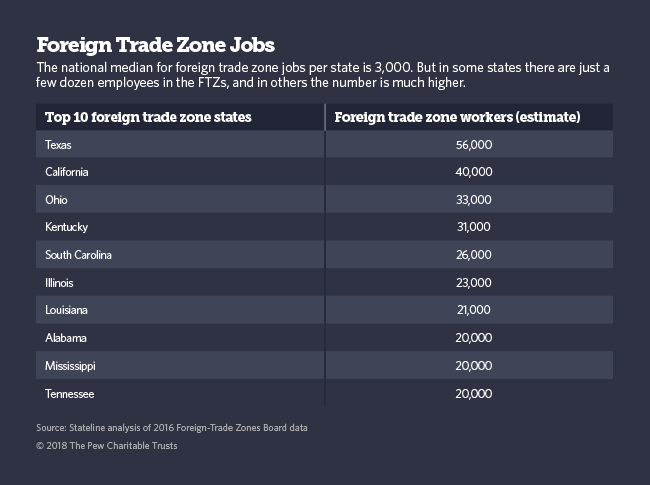Connecting state and local government leaders
There’s little research on whether foreign trade zones help or hurt the economy, or encourage companies to employ more workers than they otherwise would.
This article was originally published by Stateline, an initiative of The Pew Charitable Trusts and was written by Sophie Quinton.
LIMON, Colo. — This tiny truck-stop town, 90 miles southeast of Denver and home to fewer than 2,000 people, is flanked on all sides by endless, undulating hills. Limon’s busiest areas are its two interstate exits, where truckers and road-trippers pull over to grab gas or fast food.
There’s no major airport here, nor are there big companies that depend on international trade. Yet civil leaders believe they can boost the local economy by thinking big: Limon recently set up its own foreign trade zone, or FTZ, a designation that can help domestic and foreign-owned companies lower their customs duties and fees.
Hundreds of cities and counties have created foreign trade zones since the 1930s in a bid to attract and retain employers. As President Donald Trump announces new tariffs and threatens to scrap longtime free trade agreements, the zone program may attract more interest from companies and communities.
“In a world where trade barriers increase, foreign trade zones become more valuable,” said Matt Gold, a former U.S. trade negotiator and adjunct professor of international trade law at Fordham University School of Law in New York City.
But for many communities that have set up a zone recently, the designation has not amounted to much.
About half the 80 zones created in the past two decades didn’t have a single company using them in 2016, according to a Stateline analysis of federal data. Nationwide, 195 zones are currently active, about two-thirds of the total zones created since the program began.
Although hundreds of thousands of people work in these zones, the program’s impact on the economy isn’t clear. While supporters say the zones help U.S.-based companies compete with international rivals, critics say the zones hurt domestic suppliers by making it easier for companies to source components from overseas.
The lack of evidence didn’t stop Limon. “We see this FTZ project as not only beneficial but a practical necessity,” Mayor Julie Coonts wrote in support of Limon’s zone application to the federal Foreign-Trade Zones Board, which was approved in 2015. Without a zone, she wrote, Limon would be at a disadvantage compared to communities that already have one.
There are no real costs to having the designation, aside from the money spent on the staff time required to pull together and submit an application.
In tiny Limon, civic leaders are watching the headlines. No companies have officially joined the foreign trade zone so far. Hopefully, the zone will attract warehouses to the trucking corridor, said Troy McCue, executive director for the Lincoln County Economic Development Corporation.
“You have to buy into the long-term vision that it might be eight, 10 years before we see something, but we’ll see it,” he said.

Uncertain Payoff
The foreign trade zone program was created during the Great Depression to help companies compete with overseas rivals in an era of high tariffs. Trade barriers are much lower today, but the zones can still be cost savers for some companies—particularly automotive manufacturers, electronics manufacturers and oil refiners. And they might become more attractive if Trump’s tariffs spark a trade war.
Foreign trade zones work by being a type of customs limbo: Foreign and domestic companies that import goods into a zone can delay paying duties until the goods leave the zone. Manufacturers that operate in a zone choose whether to pay duties on their imported components or on their final product, and don’t have to pay duties on imported goods that are later re-exported.
Companies that rely on imports can realize big savings from the program. And companies that handle frequent, high-value shipments can also benefit, as zone users can streamline their paperwork and reduce customs fees.
Unlike free trade zones overseas, which usually have a geographic boundary near a port or city, U.S. foreign trade zones and subzones can be anywhere, and the geography doesn’t have to be contiguous. A company that has foreign trade subzone status through Denver’s zone, for example, has a facility in Pueblo, more than 100 miles away.
Supporters say that having a trade zone can help a community land a major employer, though it can take a while. “I’ve seen time and time again where six, nine years down the road a huge manufacturer comes in and changes the lives of the whole community,” said Craig Pool, co-founder of the Foreign-Trade Zone Corporation, a company based in Mobile, Alabama, that administers foreign trade zones and offers consulting services.
Having a foreign trade zone helped Chattanooga, Tennessee, land a Volkswagen plant in the 2008, for instance. Volkswagen only considered sites within foreign trade zones, said Steve Hiatt, director of business development for the Chattanooga Chamber of Commerce.
When it applied to the Foreign-Trade Zones Board for permission to manufacture in the Chattanooga zone, Volkswagen said being there would cost $300,000 a year in inventory management and fees but would save $1.9 million a year in reduced paperwork and customs charges.
The United Auto Workers union opposed the zone application and argued that zone authority would hurt American car companies and domestic suppliers, according to the Chattanooga Times Free Press.
Today over 2,000 people make cars and sport utility vehicles at Chattanooga’s Volkswagen plant. “The utilization of the Foreign Trade Zone helps increase our products’ competitiveness in the U.S. and abroad,” said Keith King, a spokesman at Volkswagen Chattanooga, in a statement.
There’s little research on whether foreign trade zones help or hurt the economy, or encourage companies to employ more workers than they otherwise would. Academic papers on the subject tend to present theoretical arguments about the zones rather than hard evidence, according to a 2017 Government Accountability Office review of the research.
The success of foreign trade zones may depend on community attributes beyond the mere existence of a zone, some zone managers say. Colorado relies less on exports than many other states. The cities of Denver, Colorado Springs and Limon all have zones, but only Denver’s is active.
About six companies are approved to use Denver’s zone, but fewer may be actively using it, said Abdul Sesay, the international business development representative for the city’s Office of Economic Development.
Most companies that have joined the zone are not new to Denver or came to the area for another reason, he said, such as the qualities of the area workforce or its location. Zones are common enough—and easy enough to establish — that their presence doesn’t drive corporate decisions, he said.
Colorado Springs’ experience shows that foreign trade zones don’t insulate users from broader economic trends. Apple made computers in the Colorado Springs zone in the 1990s before shifting production overseas. Quantum Corporation made data storage products there in the 2000s before it outsourced.
Pool said some companies insist on setting up a facility in a foreign trade zone but then never apply to use the zone designation. From an economic development perspective, he said, a new company benefits the community even if it doesn’t officially use the zone.
Rural Communities Hold Out Hope
Kicking back in one of Limon’s fast-food restaurants on a recent day, McCue outlined the economic challenges faced by the rural community.
“Limon can’t be the next Parker,” McCue said, naming a booming Denver suburb. “We can’t do that because we don’t have the water.” It’s so dry out on Colorado’s eastern plains that Lincoln County likely can’t support more than double, maybe triple, the 5,000-odd people who live in the county now, he said.
Towns in the area have always been small, and they’re shrinking as farming jobs vanish. Their size puts limits on their growth: Limon doesn’t have sufficient electricity, water or wastewater infrastructure to recruit many companies, McCue said.
Limon isn’t the only rural community or small town to seek a foreign trade zone designation. In recent years counties have established zones in upstate New York, Mississippi and Vermont, as have economic development organizations in northwest Iowa and coastal Maine. Some of those zones are active, some are not.
No businesses have joined the zone that Brunswick, Maine, created in 2012, for instance. There are some international manufacturers in the college town, but they may be too small to take advantage of the zones, said Jeff Jordan, deputy director of the Midcoast Regional Redevelopment Authority. “If it’s a real small operation, it’s probably not worth it.”
Joe Kiely, Limon’s foreign trade zone director, has received the application for the zone’s first company. It’s a manufacturer he declined to name that supplies parts to Vestas, a Danish wind turbine maker with four facilities in Denver’s foreign trade zone. Unfortunately for Lincoln County, the supplier is based near Denver on the far western side of the five-county zone.
Kiely purposely drew the boundaries of Limon’s zone to brush up against the Denver metropolitan area, reasoning that it made more sense to touch the state’s largest city and coax users eastward than to plop a zone in the middle of Lincoln County, McCue said. Some county commissioners have mixed feelings about the strategy, which likely will mean many zone users are far away, he said.
Kiely said it cost about $35,000 in public funds for Limon to get the foreign trade zone designation. There was little opposition: While several members of Congress, local economic development groups and businesses lent letters of support to Limon’s foreign trade zone application, no organizations filed comments against the proposal, according to the International Trade Administration, which oversees the Foreign-Trade Zones Board.
The long-term plan for Limon’s zone is to attract warehousing and distribution companies to the county, with its cheap real estate and traffic-free highways, McCue said. He has spoken with a wind turbine company that’s interested in using a foreign trade zone to store some equipment, for instance.
While there aren’t any wind turbine makers in Lincoln County, there are wind farms all over the place. Truckers that stop in Limon can see rows of turbines lazily turning on the horizon.
The mixed record of Colorado’s foreign trade zones hasn’t stopped more communities in the state from trying to get in on the action. The city of Grand Junction and its surrounding counties in Western Colorado are so committed to the foreign trade zone idea that they’re paying $1 million to establish a customs office at the small regional airport—a prerequisite for setting up a zone.
“We’ve watched the rest of the state boom, and we’re still struggling,” Robin Brown, executive director of the Grand Junction Economic Partnership, recently explained to Colorado Public Radio. Creating a foreign trade zone will make the region more attractive to manufacturers, she said.

NEXT STORY: Feds Sue to Block California Laws Protecting Immigrants



